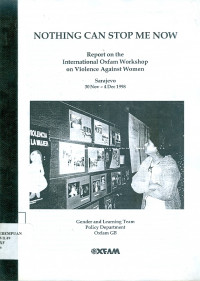
Text
Nothing can stop me now: report on the international oxfam workshop on violence against women Sarajevo 30 nov-4 des 1998
The workshop provided a forum for practitioners to share experiences and ideas and formulate new strategies to tackle violence aganist women. It was a landmark in Oxfam's understanding of violence against women and how to address it within development, relief and human rights interventions; aiming to promote institutional learning on violence against women, and influence Oxfam's policies and practice. Ending violence against women is one of Oxfam’s priorities. It is a central strategy within Oxfam’s overall goal of promoting gender equity throughout its international programme, and it is central to Oxfam’s mandate to relieve poverty and suffering. This prioritisation is the fruit of a long, although often obscure, history of Oxfam’s support of work to address violence against women around the world. It has often been obscure because it is in the nature of the issue of violence against women to be hidden, to be silenced, and to be encircled by fear, shame, and violence. It is a difficult and dangerous area in which to work. Located as it is, in the majority of cases, within the family or household, it has been regarded as a private and domestic issue, inhabiting terrain where development agencies have feared to tread. If anything, it fell within the realm of the charitable and welfare projects that characterised much of Oxfam’s programme in the 1950s and 1960s. Oxfam’s early support to community organisation and development, legal education and legal aid, and women’s groups and organisations, is likely to have had an impact on the extent of violence in the lives and relationships of women and men that has never been documented. It has not been documented because it has only relatively recently appeared in the language of development aid, and been regarded as a legitimate development concern. As has been recorded by Oxfam staff, a focus on women’s particular rights was felt to be divisive and potentially alienating to partners who did not themselves raise the issue, particularly in the context of community-based or political organisations striving for social justice. So while it may well be that Oxfam has indirectly and unknowingly contributed to attempts to stop or lessen the incidence of violence against women, it is likely that interventions were supported which may have brought about – or worsened – the violence meted out to women. A key issue that is addressed in this book is that unless development and relief agencies Preface Suzanne Williams are aware of the ways in which women are subordinated within their beneficiary group, and ta
Availability
| KP.IV.00050 | KP.IV n | My Library | Available |
Detail Information
- Series Title
-
-
- Call Number
-
KP.IV
- Publisher
- : Oxford Committee for Famine Relief (OXFAM)., 1998
- Collation
-
70 hlm. ; 29 cm.
- Language
-
English
- ISBN/ISSN
-
-
- Classification
-
KP.IV
- Content Type
-
-
- Media Type
-
-
- Carrier Type
-
-
- Edition
-
-
- Subject(s)
- Specific Detail Info
-
-
- Statement of Responsibility
-
-
Other version/related
No other version available
File Attachment
Comments
You must be logged in to post a comment
 Computer Science, Information & General Works
Computer Science, Information & General Works  Philosophy & Psychology
Philosophy & Psychology  Religion
Religion  Social Sciences
Social Sciences  Language
Language  Pure Science
Pure Science  Applied Sciences
Applied Sciences  Art & Recreation
Art & Recreation  Literature
Literature  History & Geography
History & Geography